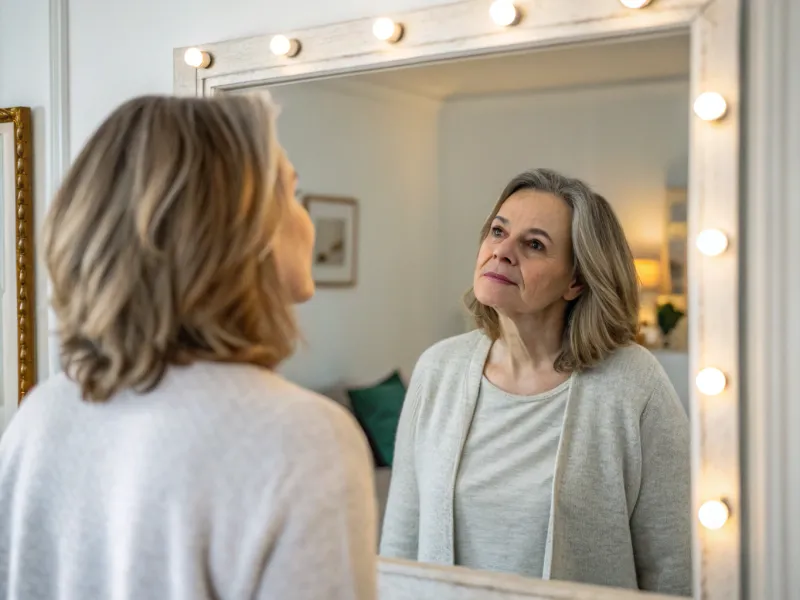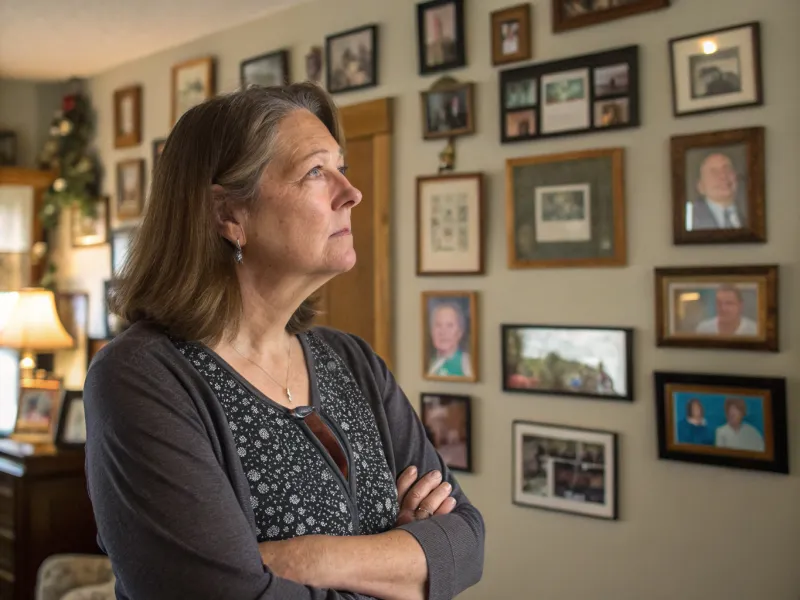36 Powerful Reasons Women Over 50 Decide to End Their Marriage
If you’ve ever found yourself staring at the ceiling at 3 a.m., pondering the complexities of life and love, you’re in good company. We’ve all been there.
You know, when the thought of “till death do us part” feels like a mountain you didn’t exactly sign up to climb. Especially for women over 50, the landscape of marriage can shift dramatically, revealing cracks and crevices you hadn’t noticed before.
In this heartfelt chat, we’re delving into the often unspoken breaking points that lead so many incredible women to reconsider the vows they once cherished. We’re talking real-life insights, a sprinkle of humor, and a whole lot of truth.
So, let’s unravel these stories together. Whether you’re contemplating a major life change or just seeking some validation, there’s something here for everyone.
1. Distanza emotiva

You know the feeling when you’re physically in the same room but miles apart emotionally? Emotional distance can creep in like a silent fog, obscuring the warmth and connection that once defined a marriage. For many women over 50, questo crescente abisso diventa un punto di rottura.
It’s not about the big fights or dramatic exits; it’s the quiet, lingering silence that speaks volumes. When conversations become functional rather than heartfelt, and the laughter that once filled the house is replaced with the sound of a ticking clock, it’s hard not to feel isolated.
This emotional detachment often stems from years of unresolved issues, unexpressed feelings, and unmet needs. It feels as if you’re living parallel lives under one roof, and yet, the loneliness is palpable. Addressing this gap isn’t easy, and sometimes, choosing to leave is the most loving decision one can make for oneself.
2. Mancanza di intimità

L'intimità, in tutte le sue forme, è il collante che tiene insieme una relazione. Quando questo collante comincia ad assottigliarsi, il legame può indebolirsi, facendo sentire una persona indesiderata e non amata. Per le donne sopra i 50 anni, rendersi conto che l'intimità è diventata un ospite raro nel loro matrimonio può essere un duro risveglio.
It’s not just about physical affection, though that is certainly a part of it. Emotional intimacy, the sharing of dreams, fears, and life’s ups and downs, plays an equally vital role. When intimacy fades, it often signals deeper issues at play, ones that might have been ignored or brushed aside for too long.
Rekindling intimacy requires vulnerability, communication, and sometimes, a lot of hard work. But when efforts to revive this crucial aspect fall flat, it may become clear that moving on is the healthiest option. It’s a tough decision, but sometimes, letting go is an act of self-love.
3. Spostamento delle priorità

Con la crescita, crescono anche le nostre priorità. Ciò che sembrava importante a 25 anni può sembrare banale a 55 anni. Molte donne scoprono che la loro crescita personale le porta su un percorso diverso da quello del partner. Questo cambiamento può diventare un punto di rottura quando gli obiettivi e i sogni reciproci non si allineano più.
It’s not uncommon for career ambitions, personal passions, or even the desire for more independence to create a rift. Perhaps you’ve discovered a new hobby or a cause that lights you up, but your partner remains unchanged, uninterested, and unengaged.
La navigazione in questi cambiamenti richiede un dialogo aperto e la disponibilità di entrambi i partner ad adattarsi. Tuttavia, a volte le differenze sono inconciliabili. Abbracciare un nuovo capitolo della vita può significare lasciandosi alle spalle ciò che non serve più al proprio io in evoluzione.
4. Risentimenti inespressi

Il risentimento può ribollire sotto la superficie per anni, erodendo lentamente le fondamenta di un matrimonio. I risentimenti non espressi, una volta ignorati, possono manifestarsi in amarezza e malcontento, creando un ambiente tossico che sembra impossibile da gestire.
These feelings often arise from unmet expectations, perceived slights, or disappointments that have never been addressed. It’s like carrying a backpack full of rocks, each one representing a slight or hurt that gets heavier over time.
When attempts to communicate and resolve these issues fail, the weight becomes unbearable. Deciding to let go of this burden can be freeing, allowing for healing and growth. It’s a courageous step toward reclaiming one’s happiness.
5. Crescere a parte

Growing apart might sound cliché, but it’s a reality for many couples. Over time, personal growth can lead partners on different paths, highlighting disparities in interests, values, and visions for the future.
This divergence often happens gradually, almost imperceptibly. One day, you might wake up and realize that the person beside you feels more like a stranger than a soulmate. The shared experiences and commonalities that once bonded you together may no longer exist.
A volte, nonostante gli sforzi per riallacciare i rapporti, il divario continua ad aumentare. Trovare un terreno comune diventa un esercizio futile, che lascia uno o entrambi i partner insoddisfatti. Riconoscere questo divario crescente può essere straziante, ma potrebbe anche essere il catalizzatore per un nuovo inizio.
6. Conflitti finanziari

Il denaro, spesso citato come una delle principali cause di conflitto coniugale, può diventare una barriera insormontabile in una relazione. I conflitti finanziari possono derivare da abitudini di spesa diverse, debiti nascosti o opinioni contrastanti sulla gestione del denaro.
Per le donne che hanno superato i 50 anni, la sicurezza finanziaria diventa una priorità, soprattutto quando la pensione si profila all'orizzonte. Scoprire discrepanze finanziarie o sentirsi non supportate nella pianificazione finanziaria può portare a un punto di rottura significativo.
Addressing these issues requires transparency, trust, and sometimes, professional guidance. However, if financial disagreements persist and threaten one’s sense of security, stepping away might be the most viable solution. Protecting one’s financial future becomes paramount, even if it means ending the relationship.
7. Infedeltà

Infidelity cuts deep, like a betrayal of the most sacred vow. For many women, discovering a partner’s unfaithfulness shatters trust, leaving scars that are challenging to heal. It’s a breaking point that often propels one to reevaluate the relationship entirely.
The pain of infidelity goes beyond the act itself; it’s the deceit, the breach of trust, and the emotional turmoil that follows. Rebuilding after such a betrayal requires immense effort and willingness from both parties, and even then, the road to recovery is fraught with challenges.
Choosing to leave after infidelity is an intensely personal decision. It’s about reclaiming dignity, self-respect, and peace of mind. For some, forgiveness is possible, but for others, moving forward means closing this chapter and starting anew.
8. Sfide per la salute

Health challenges can alter the dynamics of a marriage, often introducing stress and strain that can be overwhelming. For women over 50, navigating personal or a partner’s health issues can become a breaking point, reshaping priorities and perspectives.
Chronic illness or sudden health crises demand patience, empathy, and a shift in roles that may feel burdensome. When one partner is unable or unwilling to provide the necessary support, resentment can build, creating a rift that’s hard to bridge.
A volte queste sfide avvicinano le coppie, ma altre volte mettono in evidenza le fratture esistenti, spingendo a prendere decisioni difficili. Scegliere di dare priorità al benessere personale, anche se ciò significa porre fine alla relazione, è un atto di coraggio e di cura di sé.
9. Sindrome del nido vuoto

La partenza dei figli da casa può lasciare un vuoto palpabile, spesso definito come sindrome del nido vuoto. Per alcune donne, questa transizione evidenzia l'assenza di interessi condivisi con il partner, portando a una rivalutazione della relazione.
Dopo aver eliminato il rumore e il caos della genitorialità, le coppie si trovano ad affrontare la realtà della loro unione. Per alcuni, questo riaccende il romanticismo, mentre per altri accentua la mancanza di legame che si è sviluppata nel corso degli anni.
If the relationship has revolved primarily around the children, their absence may reveal a partnership that’s grown stagnant. Navigating this new phase requires effort to rediscover each other, but if attempts fail, it might be time to seek fulfillment elsewhere.
10. Perdita di identità

Perdere se stessi nel matrimonio è una lotta silenziosa che molti affrontano, spesso inosservata finché non diventa schiacciante. L'identità che un tempo era vivace e distinta può essere messa in ombra dai ruoli di moglie, madre o badante.
For women over 50, realizing the extent of this loss can be a wake-up call. The desire to reclaim one’s identity and pursue personal passions may conflict with the dynamics of the marriage, leading to a breaking point.
L'accettazione di questa consapevolezza implica un'auto-riflessione e il coraggio di fare scelte difficili. A volte, allontanarsi dalla relazione è necessario per riscoprire e nutrire l'essenza di chi siete veramente.
11. Crisi di mezza età

Ah, the infamous midlife crisis—a time of introspection and re-evaluation. For many women, reaching this stage prompts a desire for change and self-discovery, challenging the status quo of their marriage.
This period often involves questioning life choices, seeking new experiences, or even craving a complete transformation. For some, it aligns with their partner’s journey, but for others, it highlights stark differences in life goals and desires.
La crisi di mezza età richiede comprensione, pazienza e flessibilità da parte di entrambi i partner. Quando questi elementi vengono a mancare, si può decidere di separarsi per cercare la realizzazione personale e la felicità.
12. Incompatibilità

Sometimes, it’s simply a case of incompatibility. As individuals grow and evolve, they may find that their partner no longer aligns with their values, beliefs, or lifestyle choices. This realization can be a breaking point for many women over 50.
Incompatibility doesn’t always manifest in conflict; it can be a quiet, underlying tension that affects day-to-day interactions. It’s about recognizing that the partnership no longer feels harmonious or supportive.
Affrontare l'incompatibilità comporta conversazioni oneste e tentativi di trovare un terreno comune. Tuttavia, quando questi sforzi falliscono, accettare la realtà della situazione può portare alla decisione di porre fine al matrimonio e cercare un legame più compatibile.
13. Mancanza di comunicazione

Communication is the backbone of any relationship, yet it’s often the first thing to falter. For women over 50, realizing that conversations with their partner have dwindled to mere exchanges of information can be disheartening.
When communication breaks down, misunderstandings and assumptions can take root, leading to frustration and resentment. It’s a spiral that’s hard to escape from without conscious effort from both partners.
Ristabilire un dialogo aperto e onesto richiede impegno e pazienza. Quando i tentativi di riattivare la comunicazione falliscono, potrebbe essere il segnale di un'incompatibilità più profonda, che spinge uno di riconsiderare il futuro del matrimonio.
14. Sogni incompiuti

Con il progredire della vita, i sogni e le aspirazioni un tempo accantonati possono riemergere con urgenza. Per molte donne, la consapevolezza che il partner non condivide o non sostiene più questi sogni può rappresentare un punto di rottura significativo.
I sogni non realizzati spesso comportano un senso di perdita o di rimpianto, soprattutto se sono stati fatti dei sacrifici per la relazione. Il desiderio di perseguire passioni personali o di intraprendere nuove avventure può creare tensioni se viene accolto con indifferenza o opposizione.
Choosing to honor one’s dreams, even if it means stepping away from the marriage, is an empowering decision. It’s about valuing personal growth and happiness, and sometimes, that journey requires leaving the past behind.
15. Erosione della fiducia

Trust, once broken, is challenging to rebuild. For women over 50, experiencing a breach of trust—be it through lies, betrayal, or unkept promises—can lead to a pivotal breaking point in a marriage.
The erosion of trust often leads to suspicion, doubt, and emotional distance. It’s a heavy burden to carry, affecting the foundation of the relationship and making it difficult to move forward.
Riparare la fiducia richiede tempo, trasparenza e uno sforzo genuino da parte di entrambi i partner. Quando questi elementi sono assenti, riconquistare la fiducia diventa improbabile e porta alla decisione di andare avanti.
16. Abuso emotivo

L'abuso emotivo è un distruttore silenzioso, che spesso passa inosservato a chi non è coinvolto nella relazione. Per le donne oltre i 50 anni, riconoscere i modelli di manipolazione, controllo o degradazione può rappresentare un punto di rottura profondo.
A differenza dell'abuso fisico, l'abuso emotivo intacca nel tempo l'autostima e l'autostima. Può manifestarsi con critiche costanti, sminuizioni o addirittura comportamenti di isolamento da parte dell'abusante, lasciando la vittima in trappola e impotente.
Acknowledging and confronting emotional abuse is a courageous step toward liberation. Choosing to leave such a toxic environment is an act of reclaiming one’s life and dignity, opening the door to healing and self-discovery.
17. Abuso fisico

L'abuso fisico è una realtà devastante che molte donne devono affrontare, spesso nascosta dietro le porte. Per le donne che hanno superato i 50 anni, subire queste violenze diventa un innegabile punto di rottura, che richiede un intervento immediato.
The cycle of abuse is complex, often involving periods of calm followed by escalating violence. It’s a pattern that can trap victims in fear and dependency, making it difficult to seek help.
Breaking free from physical abuse requires immense courage and support. It’s a critical step toward safety and empowerment, allowing for a future unburdened by fear. Ending an abusive marriage is not just a choice—it’s a necessity for survival.
18. Problemi di dipendenza

Living with addiction is a relentless struggle, especially when it involves a partner. For women over 50, facing a loved one’s addiction can become an overwhelming breaking point, affecting every aspect of life.
La dipendenza introduce il caos e l'imprevedibilità in una relazione, spesso accompagnata da promesse non mantenute e fiducia infranta. Il tributo emotivo può essere immenso, lasciando una persona con un senso di impotenza ed esaurimento.
Seeking help and support is vital, but there comes a time when prioritizing one’s own well-being becomes paramount. Choosing to leave an environment dominated by addiction is a step toward reclaiming peace and stability.
19. Differenze culturali o religiose

Le differenze culturali e religiose possono arricchire una relazione, ma possono anche portare a incomprensioni e conflitti. Per le donne che hanno superato i 50 anni, queste differenze possono accentuarsi, incidendo sull'armonia del matrimonio.
When beliefs and practices clash, it can be challenging to find common ground. Compromise might seem impossible, leading to feelings of resentment or a sense of losing one’s identity.
Acknowledging these differences and their impact on the relationship is crucial. If they become insurmountable, choosing to part ways may be necessary to honor one’s beliefs and seek a more compatible partnership.
20. Responsabilità dei genitori

La conciliazione delle responsabilità genitoriali, in particolare la cura dei genitori anziani, può mettere a dura prova il matrimonio. Per le donne sopra i 50 anni, questi doveri ricadono spesso in modo sproporzionato sulle loro spalle, causando stress e risentimento.
Le esigenze del caregiving possono consumare tempo ed energia, lasciando poco alle esigenze personali o alla relazione. Se il partner non è di supporto o è assente, può esacerbare i sentimenti di isolamento e burnout.
Addressing this imbalance requires open communication and shared responsibility. However, if the burden remains unshared and overwhelming, it might prompt a reevaluation of the marriage’s sustainability.
21. Aumento dell'aspettativa di vita

L'aumento dell'aspettativa di vita porta alla consapevolezza che ci sono molti anni da vivere, potenzialmente in un matrimonio insoddisfacente.
Le donne che hanno superato i 50 anni possono valutare se vogliono trascorrere altri decenni in una relazione che non le soddisfa più. L'idea di vivere una vita piena, magari anche un secondo atto, può essere una potente motivazione per lasciare un matrimonio non soddisfacente.
Questa decisione spesso comporta la necessità di soppesare il comfort della familiarità rispetto al potenziale di una vita più ricca e gratificante.
22. Problemi di dipendenza

Dependency, whether emotional or financial, can create an imbalance in a relationship. For women over 50, dealing with a partner’s over-reliance may become a burden that leads to a breaking point.
This imbalance often results in feelings of being trapped or responsible for the partner’s well-being, overshadowing one’s own needs and aspirations. The weight of this dependency can stifle personal growth and breed resentment.
Per risolvere il problema della dipendenza è necessario stabilire dei limiti e promuovere l'indipendenza. Se questi sforzi falliscono e lo squilibrio persiste, potrebbe essere necessario allontanarsi per recuperare l'autonomia e perseguire una vita equilibrata.
23. Transizioni di vita

Le transizioni della vita, come il pensionamento o il trasferimento, possono avere un impatto significativo su una relazione. Per le donne che hanno superato i 50 anni, questi cambiamenti possono evidenziare differenze nella visione del futuro, portando a un punto di rottura.
Le transizioni spesso richiedono adattabilità e sostegno reciproco, ma possono anche introdurre stress e incertezza. Se un partner è resistente al cambiamento o non appoggia le nuove direzioni, può creare tensioni e insoddisfazione.
Per affrontare con successo queste transizioni sono necessari la collaborazione e il compromesso. Tuttavia, quando questi elementi sono assenti, la scelta di andare avanti potrebbe essere il modo migliore per abbracciare nuove opportunità e crescita personale.
24. Romanticismo in dissolvenza

Romance, the spark that once ignited passion, can fade over time, leaving a relationship feeling stale and uninspired. For women over 50, the absence of romance can be a significant breaking point, prompting reflection on the partnership’s vitality.
Riaccendere il romanticismo richiede impegno, creatività e la volontà di dare priorità alla relazione. Tuttavia, se i tentativi di ravvivare la scintilla si rivelano infruttuosi, potrebbe essere il segnale che il legame ha fatto il suo corso.
Scegliere di partire alla ricerca di nuove avventure e passioni è un passo coraggioso verso la riscoperta della gioia e dell'entusiasmo nella vita.
25. Differenze generazionali

Le differenze generazionali possono portare a incomprensioni e disconnessioni in una relazione. Per le donne che hanno superato i 50 anni, queste differenze possono accentuarsi, incidendo sulla comunicazione e sulla comprensione reciproca.
Different values, perspectives, and approaches to life can create friction, leading to feelings of being misunderstood or unappreciated. It’s a challenge that requires empathy and adaptability from both partners.
When efforts to bridge these gaps fail, it might signal a deeper incompatibility. Choosing to part ways can open the door to relationships that resonate more closely with one’s own values and experiences.
26. Negatività cronica

Living with chronic negativity can be draining, casting a shadow over daily life and interactions. For women over 50, enduring a partner’s persistent pessimism may become a breaking point, affecting mental health and happiness.
Negativity often manifests as criticism, complaining, or a defeatist attitude, creating an atmosphere of tension and dissatisfaction. It’s a cycle that’s hard to break without significant change in attitude and behavior.
Choosing to remove oneself from such a toxic environment is a step toward reclaiming positivity and joy. It’s about prioritizing one’s well-being and seeking an uplifting and supportive relationship.
27. Mancanza di apprezzamento

Sentirsi non apprezzati può erodere l'autostima e la soddisfazione in una relazione. Per le donne over 50, rendersi conto che i loro sforzi e sacrifici passano inosservati può diventare un punto di rottura.
Appreciation is a fundamental component of a healthy relationship, involving recognition and gratitude for each other’s contributions. Its absence can lead to resentment and emotional distance.
When efforts to express and receive appreciation fall short, it may prompt a decision to seek a relationship where one’s value is acknowledged and cherished.
28. Ricerca della felicità

La ricerca della felicità è un viaggio personale che può portare a rivalutare il matrimonio. Per le donne over 50, questa ricerca spesso implica la ricerca dell'appagamento e della gioia che potrebbero mancare nella relazione.
It’s about recognizing that life is too short to settle for anything less than happiness and contentment. This realization can be a powerful motivator for change.
Choosing to prioritize personal happiness, even if it means ending the marriage, is a courageous step toward a fulfilling future. It’s about embracing la possibilità di una vita piena di gioia e di scopi.
29. Desiderio di crescita personale

Per alcune donne, il raggiungimento dei 50 anni scatena un desiderio di crescita personale e di miglioramento di sé che il matrimonio non è più in grado di sostenere.
Questa nuova ricerca di sviluppo personale può creare una frattura se il coniuge non appoggia o respinge queste aspirazioni.
Il desiderio di seguire una formazione, nuovi hobby o cambiamenti di carriera può portare a rivalutare la relazione coniugale. Quando un coniuge si sente soffocato nella sua crescita, potrebbe essere il momento di considerare se il matrimonio è in linea con il suo nuovo percorso di vita.
30. Necessità di indipendenza

After decades of shared life experiences, some women desire a newfound independence. This need can stem from years of prioritizing others’ needs over their own, leading to a strong urge to reclaim personal space and autonomy.
La consapevolezza che la vita è finita può far nascere il desiderio di vivere in modo indipendente e di esplorare il potenziale individuale.
Per coloro che si sentono vincolati dal loro matrimonio, cercare l'indipendenza può essere una decisione liberatoria, anche se significa porre fine al rapporto coniugale.
31. Realizing You’ve Outgrown the Relationship

Growth is beautiful, but sometimes it means outgrowing the very things you once held close—including your marriage. For many women over 50, there’s a moment when you look at the life you’ve built and realize it no longer fits who you are today.
It’s not about blame or failure—it’s about evolution. You’ve changed, your needs have shifted, and that’s not just okay—it’s naturale. Staying in a relationship that no longer aligns with your truth can feel like wearing a dress that used to be perfect but now feels too tight in all the wrong places.
Outgrowing a marriage doesn’t mean you’ve given up—it means you’re making space for the life and love you now deserve. It’s a quiet revolution, and yes, you’re allowed to choose you.
32. Wanting Peace More Than Partnership

Sometimes, the loudest reason for leaving is the quietest: you simply want peace. Not passion, not promises—just a sense of deep, soul-soothing peace. And when your marriage has become a source of tension, drama, or emotional labor, that craving becomes impossible to ignore.
For women over 50, peace often becomes more valuable than partnership for its own sake. You’ve learned that being alone doesn’t mean being lonely—it can mean being free, calm, and finally te stesso.
So if your heart is whispering that peace is the next chapter, listen closely. Because there is no greater love than the one you give yourself by choosing a life that feels light, free, and beautifully yours.
33. Embracing a New Career Path

Sometimes, a new career can be a catalyst for change. For some women over 50, discovering a passion for a profession that excites them can lead to reevaluating their personal life. The newfound enthusiasm and independence that come with pursuing a new career path often bring clarity about what is truly important.
This revelation may highlight the lack of support or understanding from their partner, pushing them to choose independence over a stagnant relationship.
Ultimately, the desire to align their professional and personal lives can be a powerful motivator to seek separation.
34. Seeking Adventure and Travel

Adventure often beckons to those who have spent years prioritizing others. For women over 50, the longing to explore the world and experience new cultures can become irresistible. Traveling solo or with friends allows them to rediscover themselves in exciting, unfamiliar settings.
This desire for exploration can reveal a partner’s reluctance to embrace change or leave comfort zones.
The realization that life is too short to stay in one place may inspire them to conclude that a relationship no longer fulfills their adventurous spirit.
35. Desire for Creative Fulfillment

Some women discover a passion for painting they never knew existed. As their artistic skills flourish, they begin to crave the creative freedom that marriage sometimes seems to stifle. The studio becomes a sanctuary—each brushstroke expressing truths they had long kept inside.
This newfound love for art can give them the courage to reshape their lives and seek spaces where their creativity can thrive without limits.
In a world of color and canvas, women over 50 find a voice that had been quieted for too long. The joy of creating becomes essential to their identity, eventually leading to the realization that personal fulfillment is worth pursuing on their own terms. Choosing a life centered around art becomes a powerful step toward self-discovery and autonomy.
36. Rediscovery of Cultural Roots

After years some women feel an undeniable pull back to their roots. At 50, the aroma of spices and the sounds of traditional music can stir something deep in the soul. For them, reconnecting with their culture becomes a key part of rediscovering who they are.
The vibrant markets, the language of childhood, and the warmth of heritage bring a sense of belonging that may have long been missing. These experiences can ignite a deep-seated desire to fully immerse in their ancestry, often leading to the decision to part ways with a previous life.
This kind of journey isn’t just about leaving a relationship—it’s about embracing the rich tapestry of one’s past. A cultural homecoming like this offers a renewed sense of identity and purpose.







